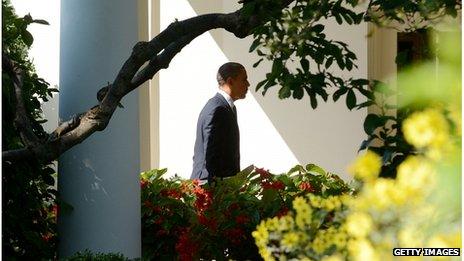Viewpoint: Libya deaths show US still faces threats
- Published

US President Obama is facing a foreign policy crisis two months before election day
The attack on the US consulate in Benghazi, Libya, is a shock with a tragic and ironic twist, but not necessarily a surprise.
It is a grim reminder that the threat the United States and the West have been dealing with for more than a decade may be reduced, but is not gone.
There are many aspects of the attack that killed the US ambassador to Libya, Chris Stevens, as well as three other American diplomats and security personnel that we do not yet know.
Was it a spontaneous protest turned violent in response to the emergence of an obscure video on YouTube criticising Islam and the Prophet Muhammad? Was it a pre-planned attack by Salafist militants sympathetic to al-Qaeda, deliberately timed to coincide with the 11th anniversary of 9/11?
Both theories are credible. But we are likely to discover many "known knowns" in the aftermath of this tragedy.
US diplomatic posts have long been inviting targets both for protests and political violence.
The nearly simultaneous attacks on embassies in Kenya and Tanzania in 1998 marked the emergence of al-Qaeda as a new global terrorist threat.

The aftermath of the Arab Spring is posing new challenges to US foreign policy
Going back to the beginning of the rebellion in Libya in early 2011, the United States feared that al-Qaeda and its affiliates might try to take advantage of the Arab Spring to re-establish its relevance as various countries moved through difficult transitions.
Ambassador Stevens was a liaison to the National Transitional Council, the umbrella organisation based in Benghazi that led the successful uprising to overthrow Gaddafi, and to the interim government that recently yielded power following successful elections.
Few Americans did more to support the emergence of a new Libya than Chris Stevens - only to become one its early and most visible victims.
Having gone through a civil war, Libya suffers from many of the typical challenges that emerge in post-conflict societies.
It is awash with weapons. Protesters who gained access to the US embassy in Cairo carried an Islamist flag. The gang which assaulted the consulate in Benghazi carried rocket-propelled grenades.
Zero sum
There was a credible election that produced a new government in Tripoli, but Libya's institutional capacity is weak, particularly its civilian police.
Whatever the state of host-nation security outside the consulate fence, it was no match for the militants.
Building a security force that can protect civil society (rather than preying on it as occurred under Gaddafi) including foreign diplomatic posts is difficult, takes significant resources and - most of all - significant time.
As Libya and other countries in transition build functioning democracies, arguably their greatest challenge will be inclusion and tolerance.
There is a zero-sum mentality that pervades these societies. Those who either oppose a genuine and inclusive political process, or try it and lose, frequently resort to violence in the aftermath.
Progress will never be linear. There will be good days and bad days. The United States just suffered one of the latter. There will be more.
- Published12 September 2012
- Published13 September 2012
- Published12 September 2012
- Published12 September 2012